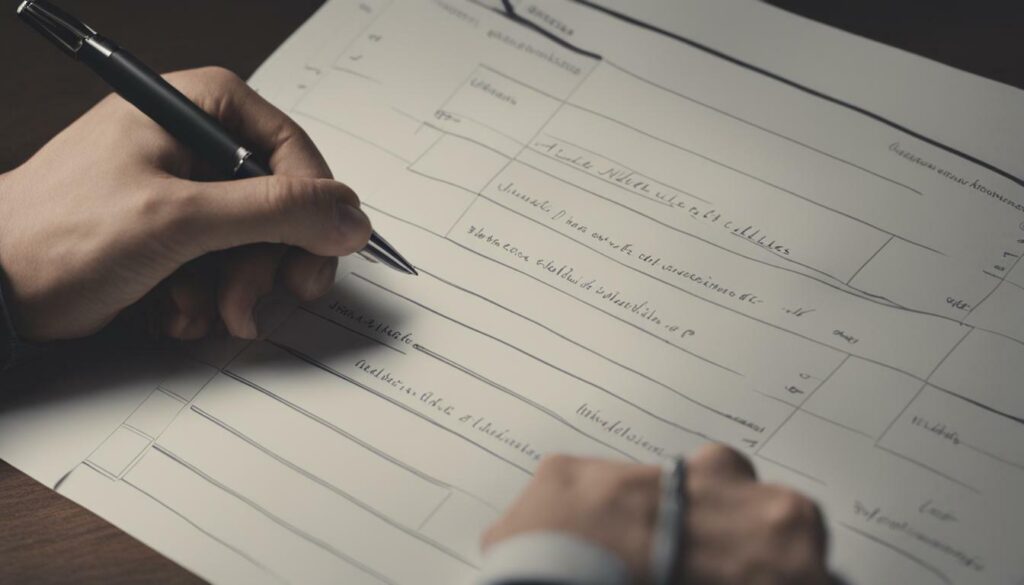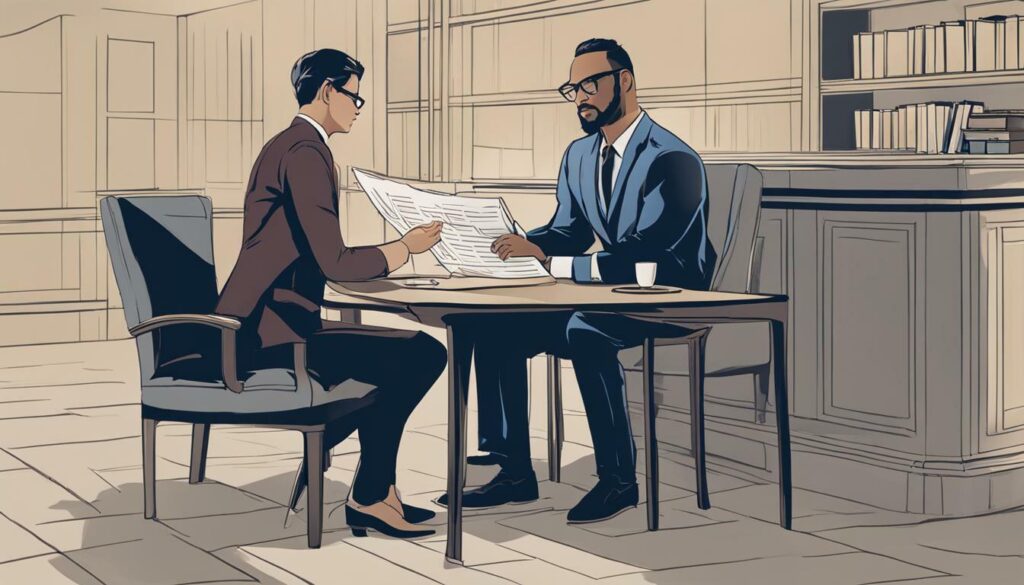Are you wondering how to prepare for a career coaching session? Follow these steps to ensure you make the most of your coaching experience.
Preparing for a career coaching session involves several important steps. Before diving into the session, take the time to reflect on your current career situation. Identify what aspects you want to change or improve, and gain clarity on your goals and aspirations.
Taking a career assessment, such as a Whole Person Assessment, can provide valuable insights into your capabilities, skills, strengths, and opportunities. These assessments offer a comprehensive view of your professional profile, helping you and your coach identify areas for development and growth.
To maximize the benefits of your coaching experience, it’s crucial to adopt a growth mindset. Embrace challenges, view failure as an opportunity for learning, and be open to new possibilities. This mindset will allow you to approach the coaching session with a positive and proactive attitude.
Before attending the session, take the time to clarify your expectations. Think about what you hope to gain from the experience and what specific goals you want to achieve. By having a clear vision of what you want, you can effectively communicate your needs and set the stage for a productive coaching session.
During your career coaching preparation, reflect on what you like and dislike about your current job. This self-reflection will help you gain insights into your preferences and identify areas for improvement or change. Discussing these aspects with your career coach will provide them with valuable information to tailor the coaching session to your needs.
Additionally, reflect on your values and purpose. Understanding these core aspects of your life will help align your career choices with your personal values, leading to greater satisfaction and fulfillment. This self-reflection will guide discussions with your career coach and assist in setting meaningful career goals.
Come prepared to the coaching session with a list of questions, an updated resume, and an open mind. Having specific questions will help address your concerns, while an updated resume will provide your career coach with a clear understanding of your background. Keeping an open mind will allow you to embrace new perspectives and ideas that may arise during the session.
Finally, be ready to set goals and take actionable steps to further your career. Work with your career coach to develop a plan that aligns with your aspirations and ambitions. By setting goals and taking concrete actions, you’ll be able to make progress and see tangible results in your career journey.
Key Takeaways:
- Reflect on your current career situation and identify areas for change or improvement.
- Consider taking a career assessment to gain insights into your capabilities and strengths.
- Adopt a growth mindset to embrace challenges and new possibilities.
- Clarify your expectations and set specific goals for the coaching session.
- Reflect on your likes and dislikes about your current job to identify areas for improvement.
Reflect on Your Current Career Situation
Start by reflecting on your current career situation and identifying the areas you want to focus on during your coaching session. Take the time to assess your professional journey and pinpoint the aspects that you feel need improvement or change. This self-reflection is crucial in gaining clarity and setting clear goals for your coaching experience.
Consider creating a table to organize your thoughts and visualize the different areas of your career that you want to address. List out the specific challenges or obstacles you are facing, as well as the opportunities and strengths you possess. This will help you better understand your current position and provide a starting point for discussions with your career coach.
| Challenges/Obstacles | Opportunities/Strengths |
|---|---|
| Feeling stagnant in current role | Strong communication skills |
| Lack of fulfillment or satisfaction | Excellent problem-solving abilities |
| Limited growth or advancement opportunities | Positive working relationships |
Remember that every career journey is unique, and your coaching session will be tailored to your specific needs. By reflecting on your current career situation, you will be better equipped to make the most out of your coaching experience and work towards achieving your professional goals.
Reflecting on your current career situation sets the foundation for a successful coaching session. As career coach Rebecca Moses once said, “Without self-reflection, change is merely a wishful thinking.”
Next Steps:
- Take a career assessment to gain a comprehensive understanding of your capabilities and strengths.
- Clarify your expectations and goals for the coaching session.
- Consider what you like and dislike about your current job to identify areas for improvement.
- Reflect on your values and purpose to align your career choices with your personal aspirations.
- Come prepared with a list of questions, an updated resume, and an open mind.
- Be ready to set actionable goals and take steps towards furthering your career.

By following these career coaching tips and planning ahead, you will be well-prepared to make the most of your upcoming coaching session. Remember, coaching is a partnership between you and your career coach, and together, you can navigate the path towards a fulfilling and successful career.
Take a Career Assessment
Enhance your career coaching preparation by taking a comprehensive career assessment that can provide valuable insights into your strengths and areas of improvement. Consider a Whole Person Assessment, a tool that offers a holistic view of your professional profile. This assessment can help you gain a clearer understanding of your capabilities, skills, and opportunities for growth.
The Whole Person Assessment evaluates various dimensions of your personality and work preferences, allowing you to discover new perspectives about yourself and your career aspirations. It assesses your interests, values, motivations, and skills, providing a comprehensive analysis of your professional profile. By understanding your strengths and areas for improvement, you can leverage this information during career coaching sessions to set meaningful goals and develop actionable plans.
Once you have completed the career assessment, discuss the results with your career coach. They can help you interpret the findings and offer guidance on how to leverage your strengths and address areas of improvement. Together, you can align the assessment insights with your career goals and create a tailored coaching plan to maximize your potential.

| Dimension | Strengths | Areas of Improvement |
|---|---|---|
| Interests | Strong interest in problem-solving and creative thinking | Limited interest in administrative tasks |
| Values | Passionate about environmental sustainability | Less motivated by financial incentives |
| Motivations | Driven by opportunities for growth and learning | Less motivated by routine and repetitive tasks |
| Skills | Excellent communication and leadership skills | Need to develop technical skills in data analysis |
By taking a career assessment and discussing the results with your career coach, you can gain valuable insights that will inform your coaching sessions and guide your career development journey. Use this information to set goals, make informed decisions, and take proactive steps towards a fulfilling and successful career.
Adopt a Growth Mindset
Approach your career coaching session with a growth mindset, embracing challenges and being open to new opportunities. Cultivating a growth mindset is crucial for personal and professional development as it allows you to see setbacks as learning opportunities and encourages you to seek out new ways to grow and improve.
As American entrepreneur Carol Dweck explains in her book Mindset: The New Psychology of Success, individuals with a growth mindset believe that their abilities and intelligence can be developed through hard work, dedication, and continuous learning. This mindset fosters resilience and a willingness to take on challenges, ultimately leading to greater success in your career.
“The passion for stretching yourself and sticking to it, even (or especially) when it’s not going well, is the hallmark of the growth mindset.” – Carol Dweck
By approaching your career coaching session with a growth mindset, you open yourself up to new possibilities and insights. Instead of viewing obstacles as roadblocks, you see them as stepping stones towards growth and discovery. This mindset allows you to explore different strategies, experiment with new ideas, and take calculated risks that can propel your career forward.
Benefits of a Growth Mindset
- Increased motivation: With a growth mindset, you are more motivated to overcome challenges and keep pushing forward, even when faced with setbacks.
- Improved resilience: Adopting a growth mindset helps you bounce back from failures and setbacks, allowing you to stay focused on your goals and maintain a positive outlook.
- Enhanced learning and development: Embracing a growth mindset encourages continuous learning and self-improvement, enabling you to acquire new skills and knowledge that can benefit your career.
- Expanded opportunities: By embracing challenges and being open to new experiences, you open yourself up to a wider range of opportunities and possibilities for career advancement.
So, as you prepare for your career coaching session, remember to adopt a growth mindset. Embrace challenges, view failures as learning opportunities, and be open to new possibilities. With this mindset, you’ll be well-equipped to make the most of your coaching experience and achieve success in your career.

Outline your expectations and goals for the career coaching session to ensure a productive and targeted discussion. By clearly defining what you hope to achieve, you can maximize the value of your coaching experience and set yourself up for success.
Setting Clear Expectations
Before attending a career coaching session, take the time to reflect on your career goals and objectives. What specific outcomes do you want to achieve? Are there any challenges or obstacles you need guidance on? By clarifying your expectations, you can communicate them effectively to your career coach and ensure that your session is tailored to your needs.
Consider creating a list of questions or topics you want to discuss. This will help you stay focused during the session and ensure that you address all of your concerns. Additionally, having a clear idea of what you want to gain from the coaching experience will enable your coach to provide targeted guidance and support.
Benefits of Clarifying Expectations
Having clear expectations for your career coaching session offers numerous benefits. First and foremost, it allows you to make the most of your time with your coach. By outlining your goals and objectives, you can guide the conversation towards the areas that are most important to you. This ensures that you receive personalized advice and strategies that are directly relevant to your career aspirations.
Not only does clarifying your expectations help you stay focused, but it also increases your chances of achieving your desired outcomes. When you have a clear vision of what you want to accomplish, you can work together with your coach to develop a customized action plan. This will help you stay accountable and take actionable steps towards your goals.
By clarifying your expectations, you set the stage for a productive and targeted career coaching session. Your coach will be better equipped to provide the guidance and support you need to navigate your career path successfully.

| Benefits of Clarifying Expectations: |
|---|
| Ensures a productive and targeted discussion |
| Allows for personalized advice and strategies |
| Increases chances of achieving desired outcomes |
| Enables development of a customized action plan |
Reflect on Likes and Dislikes
Reflect on what you enjoy and what you find challenging in your current job to uncover areas for growth in your career coaching session. Understanding your likes and dislikes is vital for identifying areas where you can excel and areas where you may need guidance and support. Take note of tasks or projects that energize you and make you feel fulfilled. These are indicators of your strengths and passions, which can be leveraged for career advancement. Similarly, pay attention to tasks that drain your energy or feel monotonous. These may highlight areas where you need to explore alternative career paths or develop new skills.
Creating a simple table can help you organize your thoughts. List the aspects of your job that you enjoy in one column, and the aspects that you find challenging in another. This visual representation will allow you to clearly see patterns and identify areas for improvement. Keep in mind that your career coaching session will provide an opportunity to explore these challenges and work towards solutions that will lead to a more fulfilling career.
| Likes | Dislikes |
|---|---|
| Collaborating with team members | Dealing with repetitive tasks |
| Problem-solving and finding creative solutions | Working in a rigid and inflexible environment |
| Leading and taking on new responsibilities | Limited opportunities for growth and advancement |
By reflecting on your likes and dislikes, you can have a constructive discussion with your career coach. They can help you explore new possibilities, suggest alternative career paths, or guide you in enhancing your skills in areas where you find challenges. Remember, career coaching is about personal growth and navigating your professional journey, so embracing these reflections will enable you to make the most of your coaching sessions.

Reflecting on your likes and dislikes is an essential step in preparing for a career coaching session. It allows you to gain a deeper understanding of your preferences and uncover areas for potential growth and development. By taking the time to identify what you enjoy and find challenging in your current job, you can effectively communicate your needs and goals to your career coach.
- Consider the tasks or projects that bring you joy and fulfillment. These are indicators of your strengths and passions.
- Pay attention to the tasks that drain your energy or feel monotonous. These may highlight areas where you need support or a change in direction.
Creating a simple table can help you organize your thoughts. List your likes and dislikes in separate columns, allowing you to visually assess patterns and identify areas for improvement. This visual representation will serve as a useful reference during your coaching sessions.
Remember, reflecting on your likes and dislikes is not about criticizing your current job, but rather understanding your unique preferences and finding ways to align your career choices with them. By sharing this information with your career coach, you can work together to create a plan that maximizes your strengths and addresses any challenges you may face.
Reflect on Values and Purpose.
Explore your values and purpose to ensure your career choices align with your personal aspirations during your coaching session. Understanding your core values will help you make decisions that are in line with what truly matters to you. Consider creating a list of your top values, such as integrity, creativity, or flexibility, and use them as a guidepost when evaluating potential career paths or opportunities.
Reflecting on your purpose can also provide valuable insight into the type of work that will bring you fulfillment. Ask yourself what drives you, what impact you want to make in the world, or what legacy you hope to leave behind. This self-reflection will help you align your career choices with your personal aspirations, ensuring that your work is meaningful and fulfilling.
Discover Your Passions
In addition to reflecting on your values and purpose, take the time to discover your passions. What activities or subjects do you find yourself naturally drawn to? What tasks or projects energize you? By identifying your passions, you can pursue a career that aligns with your interests and allows you to follow your genuine enthusiasm.
Remember, your career coaching session is an opportunity to explore different possibilities and gain clarity on your career path. Use this time to dive deep into your values, purpose, and passions, and discuss them with your career coach. They can provide guidance, ask thought-provoking questions, and help you uncover new insights that will shape your career decisions.
| Value | Definition |
|---|---|
| Integrity | Adhering to strong moral and ethical principles in all aspects of life and work. |
| Creativity | Expressing oneself through innovative thinking, problem-solving, and artistic endeavors. |
| Flexibility | Adapting to changing circumstances, embracing new challenges, and being open to different perspectives. |
“Your values and passions should be the driving force behind your career choices. When you align your career with what truly matters to you, success and fulfillment naturally follow.”
Remember, your values, purpose, and passions are unique to you. Take the time to reflect on them and write them down. This will serve as a foundation for making informed career decisions and ensure that your coaching session is productive and tailored to your needs.

Arrive at your career coaching session fully prepared with a list of questions, an updated resume, and an open mind. Having thoughtful questions ready will allow you to address your concerns and gain valuable insights from your coach. It’s important to communicate your needs and expectations clearly, so take the time to think about what you hope to gain from the coaching experience.
An updated resume is crucial as it provides your career coach with a comprehensive understanding of your background, skills, and accomplishments. This will help them tailor their guidance and advice to your specific goals and aspirations. Make sure your resume is up to date and highlights your key achievements and experiences.
Additionally, approach your career coaching session with an open mind. Be willing to explore new perspectives and ideas that may challenge your current thinking. Remember, the purpose of career coaching is growth and development, so embracing new possibilities is essential. Stay open to feedback and be prepared to make changes and adjustments along the way.
Table: Questions to Ask in Your Career Coaching Session
| Question | Description |
|---|---|
| What are my strengths and how can I leverage them in my career? | Identify your unique strengths and figure out ways to harness them for professional success. |
| What are some potential career paths that align with my interests and values? | Explore different career options that resonate with your passions and core values. |
| How can I improve my skills or acquire new ones to advance in my chosen field? | Determine the skills you need to develop or acquire to progress in your career and discuss strategies to acquire them. |
| What steps can I take to overcome challenges or obstacles in my career? | Identify the barriers that may be hindering your progress and develop a plan to overcome them. |
By coming prepared to your career coaching session, you’ll be able to make the most of the experience and set yourself up for success. Remember to bring your list of questions, an updated resume, and an open mind. Embrace the opportunity for growth and take actionable steps towards achieving your career goals.

Collaborate with your career coach to set meaningful goals and develop practical steps to propel your career forward. Your coach will guide you through this process, providing valuable insights and support along the way.
During your coaching session, take the time to discuss your aspirations and ambitions. Together with your coach, you can identify specific goals that align with your values and desired career path. Whether it’s advancing in your current role, transitioning to a new industry, or starting your own business, setting clear objectives will give you a sense of direction and purpose.
Once the goals are set, it’s essential to develop actionable steps to achieve them. Your career coach will help you break down your goals into manageable tasks, providing you with a roadmap for success. These steps may include gaining additional skills or qualifications, networking with industry professionals, or seeking out new opportunities for growth.
Remember, taking action is key. It’s not enough to simply set goals; you must also be willing to put in the effort and take the necessary steps to make them a reality. Embrace the guidance and expertise of your career coach, as they will provide you with valuable strategies and resources to support your journey.
FAQ
Q: How do I prepare for a career coaching session?
A: To prepare for a career coaching session, reflect on your current career situation, take a career assessment, adopt a growth mindset, clarify your expectations, reflect on what you like and dislike about your current job, and consider your values and purpose. Come prepared with a list of questions, an updated resume, and an open mind.
Q: Why is it important to reflect on my current career situation?
A: Reflecting on your current career situation allows you to identify what aspects of your career you want to change or improve. This self-reflection provides a starting point for your coaching journey and helps you gain clarity.
Q: What is a career assessment and why should I take one?
A: A career assessment, such as a Whole Person Assessment, provides insights into your capabilities, skills, strengths, and opportunities. It offers a comprehensive view of your professional profile and serves as a valuable tool for your coaching session.
Q: How can adopting a growth mindset benefit my career coaching experience?
A: Adopting a growth mindset allows you to embrace challenges, view failure as an opportunity for learning, and be open to new possibilities. This mindset is crucial for personal and professional development and will help you make the most of your coaching session.
Q: Why should I clarify my expectations before a career coaching session?
A: Clarifying your expectations helps you set clear goals for your coaching session and effectively communicate your needs. By having a clear vision of what you want to achieve, you can maximize the benefits of the experience.
Q: Why is it important to reflect on what I like and dislike about my current job?
A: Reflecting on what you like and dislike about your current job provides insights into your preferences and helps you identify areas for improvement or change. This self-reflection will be valuable in discussions with your career coach.
Q: How can reflecting on my values and purpose impact my career coaching journey?
A: Reflecting on your values and purpose helps you align your career choices with your personal values, leading to greater satisfaction and fulfillment. This self-reflection guides discussions with your career coach and assists in setting meaningful career goals.
Q: What should I bring to a career coaching session?
A: Come prepared with a list of questions, an updated resume, and an open mind. Your questions will help address your concerns, an updated resume provides your career coach with a clear understanding of your background, and an open mind allows you to embrace new perspectives and ideas.
Q: How can I set goals and take action during a career coaching session?
A: Work with your career coach to set achievable goals and develop actionable steps to further your career. By setting goals and taking concrete actions, you’ll make progress and see tangible results. Your career coach will provide support and guidance throughout this process.
